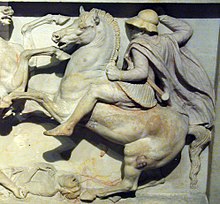http://www.vice.com/read/did-the-ancien ... -get-ebolaIn 430 BC, an incredibly nasty plague hit Athens. Dubbed "the Plague of Athens" by relatively unimaginative historians, the epidemic gave citizens red skin, diarrhea, and high fever, among other symptoms. Modern-day academics have no idea what actually caused all this suffering, though they've guessed it could have been Typhus, measles, smallpox, or even toxic shock syndrome.
But Powel Kazanjian, a professor of medicine at the University of Michigan, has his own theory about the culprit: According to him, it's none other than our old friend Ebola.
"The clinical features of the plague resemble Ebola at least as well as the other conditions historians have considered," Kazanjian, whose paper "Ebola in Antiquity" was published in Clinical Infectious Diseases earlier this month, told VICE. According to him, this connection can be made thanks to fresh information about the epidemiology of Ebola gathered from the horrific outbreak in West Africa.
Like most scientists, he's quick to point out that his conclusions aren't the only possible answer, however. "At the end of the day, the answer is that Ebola is a possible cause, as are the other conditions that historians have speculated," Kazanjian said.
Ebola Outbreak In Ancient Greece?
-
Penner

- Posts: 3350
- Joined: Tue Nov 29, 2016 10:00 pm
Ebola Outbreak In Ancient Greece?
So, I saw this article on Vice and I was wondering if anyone has any thoughts about the possibility that an Ebola outbreak might have happened in 430 BC Greece? Personally, I don't believe that this plague was Ebola, per se, but what if it was something similar to Ebola? You see the 430 plague (also know as the Plague of Athens) was one of those ancient plagues that modern historians really don't know what disease it was specifically (I can think of one more example where plague was sweeping through Ancient Rome in the 3rd Century) so an idea like this isn't too uncommon but it seems like a far stretch for many to believe.

-
katarn

- Posts: 563
- Joined: Thu Dec 01, 2016 1:30 pm
Re: Ebola Outbreak In Ancient Greece?
If it happened, it means ebola jumped the species gap and then subsided before jumping it again in the 1900s. Possible, but I (being completely unqualified) think other diseases are to blame.Penner wrote:So, I saw this article on Vice and I was wondering if anyone has any thoughts about the possibility that an Ebola outbreak might have happened in 430 BC Greece? Personally, I don't believe that this plague was Ebola, per se, but what if it was something similar to Ebola? You see the 430 plague (also know as the Plague of Athens) was one of those ancient plagues that modern historians really don't know what disease it was specifically (I can think of one more example where plague was sweeping through Ancient Rome in the 3rd Century) so an idea like this isn't too uncommon but it seems like a far stretch for many to believe.
http://www.vice.com/read/did-the-ancien ... -get-ebolaIn 430 BC, an incredibly nasty plague hit Athens. Dubbed "the Plague of Athens" by relatively unimaginative historians, the epidemic gave citizens red skin, diarrhea, and high fever, among other symptoms. Modern-day academics have no idea what actually caused all this suffering, though they've guessed it could have been Typhus, measles, smallpox, or even toxic shock syndrome.
But Powel Kazanjian, a professor of medicine at the University of Michigan, has his own theory about the culprit: According to him, it's none other than our old friend Ebola.
"The clinical features of the plague resemble Ebola at least as well as the other conditions historians have considered," Kazanjian, whose paper "Ebola in Antiquity" was published in Clinical Infectious Diseases earlier this month, told VICE. According to him, this connection can be made thanks to fresh information about the epidemiology of Ebola gathered from the horrific outbreak in West Africa.
Like most scientists, he's quick to point out that his conclusions aren't the only possible answer, however. "At the end of the day, the answer is that Ebola is a possible cause, as are the other conditions that historians have speculated," Kazanjian said.
That plague in Rome hit Han China too. Was basically the Classical Black Nuclear Death.
"Stone walls do not a prison make, nor iron bars a cage...
If I have freedom in my love
And in my soul am free,
Angels alone that soar above
Enjoy such Liberty" - Richard Lovelace
If I have freedom in my love
And in my soul am free,
Angels alone that soar above
Enjoy such Liberty" - Richard Lovelace